Gwinnett Center for Sexually Exploited Children (CSEC)
Ace Hardware
Work After COVID-19: Connection, Culture, and Reputation
Our desire to connect is a survival instinct
Even before COVID-19, loneliness was considered a public health problem by cognitive and social scientists. While many employees have thrived in the new reality of working from home, many have also struggled with a sense of isolation and loss of connectedness with their co-workers.
Humans are primates, and in the competition for survival, the practice of living in societies where resources, information, and protection are shared has provided humanity a distinct advantage. The modern workplace is also an intimate social group where cooperation and interaction with other group members play a crucial role in our business survival. Our yearning for the camaraderie of the workplace is part of our survival instinct.
Humanity is currently engaged in a purposeful evaluation of what we’ll allow back into our lives post-pandemic. That evaluation will impact our expectations of businesses and brands. We can expect to see the previous standards, expectations, and behavioral patterns of workers to evolve rapidly. The shutdown accelerated an already massive shift toward mobility and remote working. Workplaces will need to support smaller onsite and remote team interactions.
Decompressed density means that some of us will be working remotely, and some will work in shifts.
We believe that employer brands will move beyond a focus on recruitment and retention strategies toward a more integrated and holistic influence on the fulfillment of overall brand objectives.
Extraordinary times, require extraordinary resolve
As organizations face uncertainty, the need to reinforce the business’s core drivers becomes even more critical. Inspiring loyalty and driving performance are easier when employees care about what you do, understand your values, and are genuinely inspired by your vision and purpose.
The boundaries between being physically in the office and out of the office are collapsing. We envision a “redefined essentialism” in the design of future workplaces, dispensing with practices and tools that no longer serve the future. Reinventing these spaces to become epicenters for organizational priorities, building social networks, and organizational development. Developing fit-for-purpose workplaces will make them the driving force behind collaboration and collective intelligence.
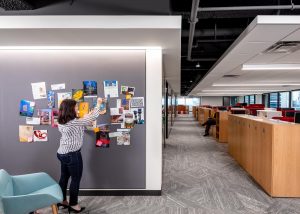
The Trust Ecosystem
When the world seems precarious and uncertain, a resilient organization becomes even more important. Organizations who operate with a shared sense of purpose and trust are more capable of swiftly adapting to change. A Watson Wyatt study shows that high-trust organizations outperform low-trust organizations by 286% in total return to shareholders.
“Trust is not merely a soft, social virtue; rather, trust is a pragmatic, hard edged, economic, and actionable asset that you can create.” Stephen M.R. Covey
Deloitte Insights describes the four dimensions of trust as physical, emotional, financial, and digital. Post–COVID-19, business leaders can future proof their business by creating strategies that take the needs of all stakeholders into consideration, across these four dimensions.
Here are the ways the four facets of trust can inspire the future role of winning employer brands and workplaces in the pre-Vaccine COVID-19 era.
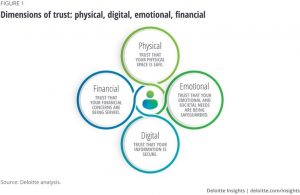
Physical Trust
The workplace has a unique opportunity and responsibility to become a safe haven. Provide visible solutions for sanitation and germ mitigation, reassuring guests and employees they are safe. Leverage tactics inspired by WELL Building Standards, the office can become the trusted environment employees need.
Emotional Trust
Increase cooperation between marketing and HR brand stakeholders to create holistic solutions that build upon each other. Create symbols of trust to nurture a shared sense of connection and solidarity. Provide reliable alternatives to connecting face-to-face and enhance remote work capabilities. Amplify opportunities for collective initiatives that uplift everyone and reinforce a shared vision for success.
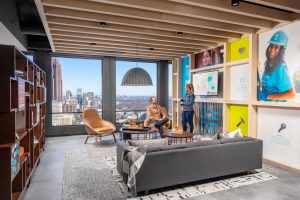
Financial Trust
Reassure employees with transparent communications around business health, company plans, and intentions. Help them understand that as the economy and business recover, so, too, will employee pay. Extend trust and empower autonomy to demonstrate your loyalty and confidence.
Digital Trust
With more remote work, employees will be concerned that their work-related and personal data are secure and private. Invest in behind-the-scenes solutions, systems, and network infrastructures to create a flexible workplace that adapts to the new reality.
As we seek to normalize operations, employers will be held accountable for operating with integrity and empathy, standing for something, and taking responsibility. The connection between brand purpose, culture, trust, and values is more evident than ever before. Prioritizing connection, culture and reputation enables organizations to prosper in uncertain times.
Part I: In The City with NELSON NYC
New York City is home to the largest population of designers in the country. Over 45,000 creatives work within the city limits each day making it a global hub for inspiration and creativity. NELSON New York is proud to be part of this community, designing some of the city’s most innovative environments, from corporate offices to retail flagships. To highlight all the exciting things going on “In The City” and at NELSON Worldwide, we’re unwrapping a three-part series that introduces some of our creative leaders and shares their thoughts on New York City’s design landscape.
Part I of our three-part In The City with NELSON NYC series introduces you to Holly Williamson, Design Director and member of our Global Solutions team.
Q: Who are you as a designer? Tell us more.
As I grow as a designer I lean towards classic design that won’t look trendy in years to come. I like playing with materiality, texture, neutral colors and lighting to make spaces memorable. Mentoring young designers is very important to me, they bring fresh ideas and a different perspective. I encourage everyone to bring their design ideas to the table, even odd ball ideas might lead you to the final design solution. See a few of our latest and greatest projects below (some complete and some coming soon)!
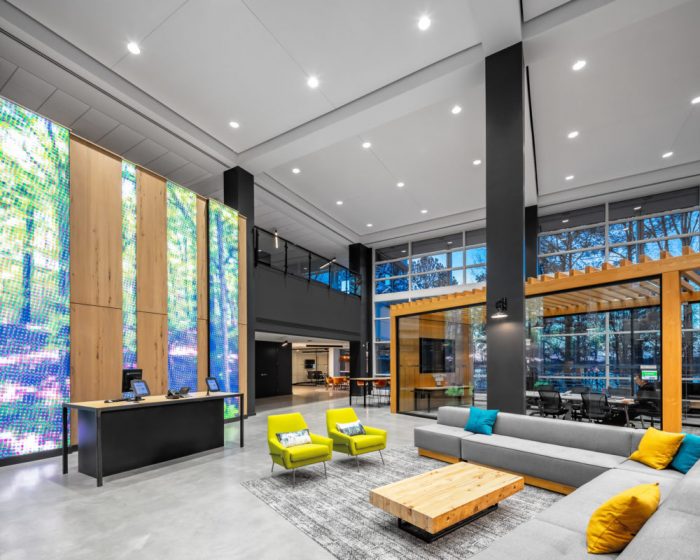
Q: 6 words that describe what it’s like to be a designer in NYC. Go!
Fast.
Fun.
Creative.
Energizing.
and Exhausting,
BUT AMAZING!
Q: What are some architecture and interior design trends in NYC you’re seeing at the moment?
Clients are embracing the blending of hospitality and retail into corporate interiors which allows us so many great opportunities for creative spaces. More workplace clients are understanding the importance of integrating outdoor spaces to work/dine in. Many Global Solution clients are turning away from one size fits all design and instead focusing on local design concepts to help make the spaces unique to help attract and retain talent and help define the brand. This can be anything from local artwork, locally sourced materials/furniture, to custom Environmental Graphics Branding that showcases the area or even brining in local restaurants to cater in their cafeterias or pop up cafes/food truck days.
Q: How has the design landscape in NYC changed over time?
I came to New York in the early 2000s after spending time in San Francisco during the dot com boom. I felt that New York was not nearly as forward-thinking as San Francisco was then. So much of New York still had the “I need the corner office” mentality. I feel that NYC is pushing boundaries and creating positive change in workplace design. It helps that many tech companies have offices in NY to help push the needle
Q: What are your favorite types of projects to work on?
I enjoy working on large scale corporate projects with multiple amenity spaces. I love to develop the overall concept for a space with many functions. Activating all portions of the building is an exciting challenge and allows for special moments to focus in on. We recently completed a corporate campus in Raleigh/Durham and it had: a full-service cafeteria, tech help desk, barista bar, fitness center, multiple micro-markets, a training center, Executive Briefing Center, outdoor walking paths and numerous: wellness rooms, pantries, coffee bars & outdoor terraces/patios throughout the project.
Q: What’s it like to work at NELSON NYC?
Working at NELSON is fun! Every day is a new day for me. As Design Director I’m fortunate to oversee many different clients and each one has its own unique design stamp. The success of the projects really comes from everyone involved on our team. From juniors all the way up to senior staff, we work hard to exceed our client’s expectations, and everyone is encouraged to bring their ideas and challenge themselves. I also feel fortunate to be part of a larger organization where my counterparts in other offices are reliable sounding boards and friends. I’ve had the opportunity to work with designers from around the country exposing me to endless creative ideas and fresh approaches.
Fast Food Goes Organic
While attending a wedding this past weekend in Santa Rosa, California, I did a double take when I drove by a drive-thru restaurant with grass growing from the roof and a water tower in the lawn. I quickly recognized the Amy’s logo – not because of my familiarity with the restaurant, but from the numerous Amy’s products (from soups to frozen pizza) I’ve consumed over the years. Known for their organic and gluten-free options, Amy’s Kitchen products are sold at most major grocery stores from Walmart to Fresh Thyme.
What I didn’t know was that in July of 2015, the brand opened their first drive-thru restaurant less than 15 miles from their headquarters in Petaluma, CA. Other than soda, everything on their menu is organic (with plenty of vegan and gluten-free options). But beyond their menu, the brand celebrates their roots in every touchpoint of the experience – from solar panels, to the living roof, to the tower collecting rainwater to help sustain the landscaping, the fast food prototype seems to be a perfect extension of the wholesome brand.
With today’s consumer more focused on overall wellness and transparency versus low calorie and low carb, a true drive-thru prototype built on a strong brand story and healthier options has the potential to gain popularity. So if you are ever in Sonoma, make time to check it out (…eating organic will make you feel better about the wine tasting that will be sure to follow)!
Photo Credit: Amy’s Drive Thru, KQED Food, Business Insider
Insurance Provider Technology Center
Hanging Around
Being part of the Hospitality Studio, I am always interested in staying at unique and different lodging experiences when traveling. So, on a recent trip to the Pacific Northwest with my husband and friends, we journeyed a little further north than originally planned to spend the night in sphere tree houses. It was definitely worth it!
Located in a coastal rainforest on Vancouver Island, British Columbia, Canada, the spheres are the creation of Tom Chudleigh. We had a chance to meet Tom and see his workshop where he is currently constructing more sphere tree houses. He utilizes techniques from boat building when constructing and outfitting the spheres. Practically everything is made by Tom, even the hinges and locks for the windows and doors.
The spaces inside the spheres are incredible efficient with storage nooks in any “open” space. Each are equipped with a bed, seating and a kitchenette area enough to make coffee or tea in the morning. There is no running water in the spheres but the bath facilities are very close by. Each sphere is hung in middle of three trees in a way that doesn’t harm but allows the tree to continue to grow and thrive.
If you ever find yourself on Vancouver Island, I high recommend making the journey to forest and staying in a Free Spirit Sphere!
Photo credit: Free Spirit Sphere
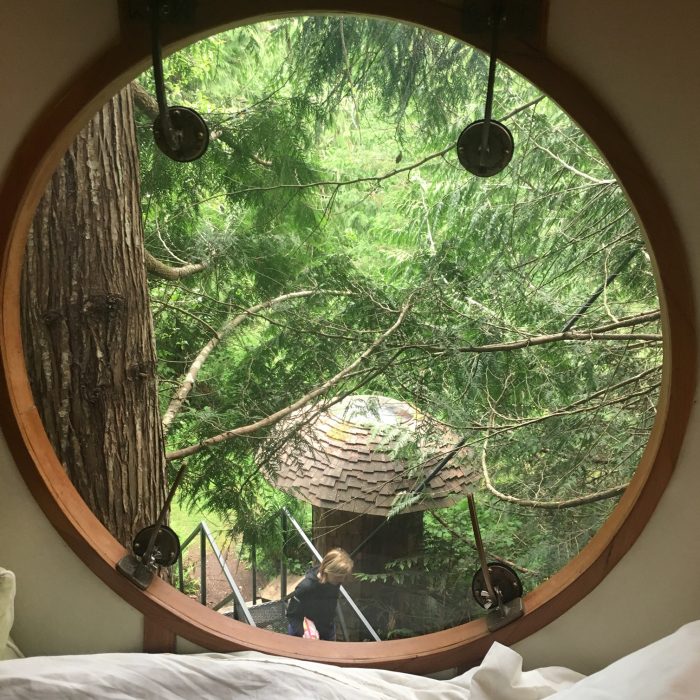
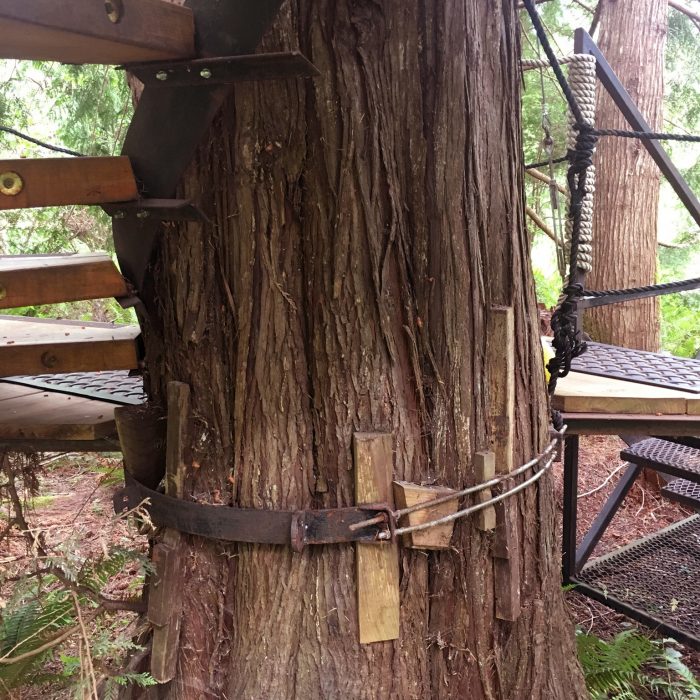
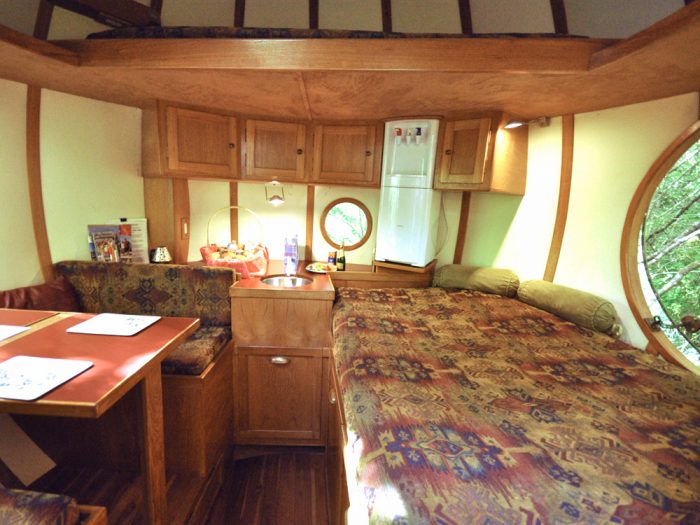
The Slow Death of the Dedicated Attorney Office
Some attorneys start to get nervous when workplace designers discuss the private office. Why? We live in a corporate world now dominated by open layouts and free address plans, some very successful and others, less so. As law firms continue to modernize and explore trends that were long ago adopted by other industries, we’re seeing more of them embrace progressive space concepts than ever before. Does this mean dedicated, private attorney offices are on their way out?
Civic & Justice
Holiday Retail Unwrapped 2021
This year, retail brands are facing new challenges as shoppers return to stores and have a new outlook on fulfilling their holiday shopping lists after the height of the pandemic. Brands must rapidly evolve to stand out among competitors by ramping up their holiday strategies both online and in-store.
This holiday season we are sharing key insights that will drive retail transformation into the new year. Download the full report today.